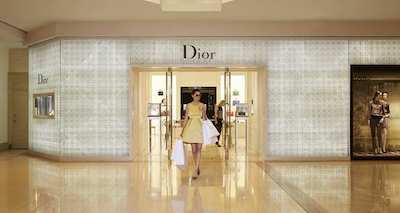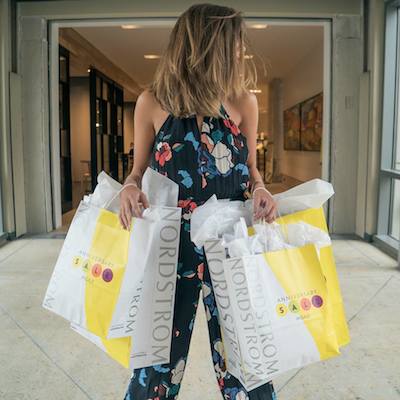Luxury retailers are failing to transition the customized, high-service experience that big spenders have become accustomed to from the store to their digital channels.
A study from Cue Connect looked to get inside the mind of millennial shoppers through a survey of 1,000 individuals within the generation, identifying five top consumer profiles in the process. With shopping being an emotional activity, having psychographics on the luxury clientele of tomorrow can help retailers strategize their marketing to prepare for the future.
"In a world where almost anyone can have what they want, when they want, how they want it, loyalty is the ultimate currency," said Berkley Bowen, CEO/founder of Cue Connect. "By fully utilizing shopper intelligence gleaned from important solutions, such as wishlist technology or social sharing tools, retailers can provide a luxury experience to every shopper.
"Unlocking new value from existing shopper behavior leads to higher satisfaction levels, increased site traffic, improved conversion rates and larger basket size and average order value," he said. "It also allows retailers to employ engagement strategies that put their customer’s feelings first in order to be more empathetic to their wants and needs.
"People respond to people and retailers can create meaningful and loyal relationships with consumers by pulling insights from these tools and solutions to understand their habits and preferences, while also adding a layer of humanity to each personalized touchpoint. Retailers with this strategy are ready and prepared when consumers shop, knowing what consumers care about, sharing inspirations and ideas and responding to questions in real-time."
Psychographic profiling
Key for luxury stores, the “Elite Shopper” is said to be the individual with immaculately styled hair and on-trend attire. These consumers are willing to spend for the right one-of-a-kind product, but they expect a high level of service from the brands they shop with.
Invite-only events, personalized messaging and hospitality such as Champagne upon their arrival in-store can make them feel special.

Dior at South Coast Plaza
"The Elite Shopper lives for exclusive offerings, invite-only flash sales, Champagne upon arrival, and isn’t afraid to shell out money for one-of-a-kind products," Mr. Bowen said.
"However, because they are spending money for exclusivity, they expect to be treated differently than the average consumer in store and out," he said. "By providing one-to-one marketing through personalized touchpoints across all channels, retailers can develop meaningful relationships with these customers to ensure they keep them coming back for more.
"Unique ways that retailers can reach these Elite Shoppers include, 'invite-only' messages for first-looks at new products or opportunities to shop and buy straight from the runway. These shoppers also respond to loyalty points and trunk shows on in-season products.
"Given that 66.7 percent of respondents wish that their retailer’s online site had the capabilities to keep track of their favorite brands and sales, retailers should align their personalized activities with customer preferences to avoid early markdowns and shopping cart abandonment."
The majority of shoppers, 47.6 percent, say that earning loyalty points make them feel most valued, beating out invites, sale alerts or knowing their name.
On the opposite end of the spectrum from the Elite Shopper is the “Bargain Hunter,” who is most focused on getting a good deal for the item they want. These shoppers want notifications when something from their wishlist goes on sale, and it is a way for retailers to foster loyalty among this audience.
When shopping online, millennials most desire the capability to follow their favorite brands and sales, with 66.7 percent identifying that feature as their top wish.
Sale messaging is a way to prompt purchases from millennials, as 57.4 percent say that receiving a discount code from a retailer makes them more apt to buy. Additionally, 55.5 percent say that the perceived value of a retailer goes up if it has the best price for a particular item online.

Nordstrom anniversary sale
The “Frugal Fannie” takes this budget-conscious perspective to an extreme, only buying when she needs to replace something. Since this shopper is more motivated by need than by sales or promotions, a good way to retain her loyalty is to remind her to purchase again when she is likely looking to replace something previously purchased.
Opposing their frugal counterparts, the “Impulse Buyer” is just looking for a reason to buy. Suggested items and bundling offers are a way to prompt this shopper to add to her cart, as she responds to what is placed in front of her.
About half of consumers have bought something from the suggested items displayed as they browsed an ecommerce site.
Consumers are split almost evenly between being motivated to shop by items they desired going on sale, an absolute need or simply because they were in the mood.
Social shoppers fit into the last category, seeing shopping as a fun activity to be shared. While this used to mean bringing friends to a physical store for a second opinion, today they are more apt to turn to their social networks for approval before making a purchase.

Neiman Marcus' CUSP
About half of consumers say their friends and family have a heavy or some influence on their decision to buy, with those in urban areas twice as likely as their suburban peers to say that their circle has a large impact on their shopping choices.
Consumers are posting and sharing with their social network, but often they are organizing their desired items away from the ecommerce experience. While the wishlist holds opportunities for building a profile of a consumer’s interests and taste, 60 percent of millennials have never used this tool.
Contrary to the idea that millennials are more mindful when it comes to where their wallet goes, only 10 percent of respondents say they most value a retailer's philanthropy when making a purchase online.
Thinking ahead
As baby boomers age and millennials mature into established consumers, luxury brands will have to retool many of their marketing strategies to account for the generational shift, according to a new report by Unity Marketing.
“Millennials on Road to Affluence: Mapping a Path to the Next Luxury Generation” says that in approximately 10 years, the next consumer spending boom is scheduled due to the influx of millennial consumers who have traveled on the road to affluence. The consumers, who will be between the ages of 34-54 years old in 2015 to 2034, will replace baby boomers as the prime target for marketers working at both the high-end and low-end of the market (see story).
While millennial consumers have the weakest buying power, they are the most likely of any adult generation to have purchased a luxury good or service within the last 12 months, according to a recent report from the Shullman Research Center.
A lot has been made of the up-and-coming consumers, as marketers seek to woo them to their brand even before many of them have the means to make high-end purchases. This strategy may pay off down the line, but luxury brands would be smart not to ignore more established clientele today (see story).
"Although some millennials’ budgets might be small, their aspirations are high, and while they continue to grow in the careers and personal lives it is important to build a relationship with these shoppers, which will continue to grow and prosper," Mr. Bowen said.
"If retailers have insights into what their key shoppers' interests are both explicitly and implicitly, based on preferences, past purchase history, click-through, social shares and wishlists, they can better personalize each touchpoint and begin to build that meaningful, loyal relationship," he said.
"The biggest opportunity for a luxury brand to attract millennial customers is to showcase a personalized luxury experience as a special circumstance and, while it may not be something they can afford all of the time, it serves as a meaningful occurrence when they can get it.
"Burberry and other successful luxury brands have huge millennial followings because they meet these digital customers through the channels they prefer, like Instagram or Snapchat."
{"ct":"ucWgthbLP0iBLvXu+ETMolT5+P+46gUsD0W5lX3RWQ76K50lFCjt7QyEoPumw9VU1MRNYfDblBhO7mT4R4VJNUEHa7uwxB1vspPeFYQhNxIDNgfmu76lWZR2OdjxECD0796ww9Z\/JPjsQjd3lTJs2pGXATVbQ3NII4Di637pzZpUWSpw2Kj\/VkUkEakuXiesyaHpLG2gCZBr71AV\/MH29mvvDgA9k6222ZI\/lteJ8zpQBlrfLUD9KuR7O8\/jc81cws\/Kw3X+vyb6q5GJmR3\/TOh8sANR7HA9igRCGhre96W0udhJO8AKBd0+Y8kHOtjy9XY6WjPggf5+XVlRp0p2LWcaiI+JR9RfNGFo4XRrzESWEDna2+0xp8czdAwElotoYoGHqJBGfr6IPQW9cDCibZkUWl3CNwExXpg4WR+p7GEFqavRyWm9y4LvJsGxpoakGeu8vy4h5FdpkP6xMzp64El\/5Tn0kv2QKRMERQvM+93UzxXR8VhnEGEoFY\/OrKY+ejgAx0Bdjpeh9eORmh9qqxnJ4MBXDc2Vw2kxRIos1aysRBH72kLQhUU5K3Y1LG4plJKwR9hfW17ZBbiOn9Ac5EK+tJ0dYGwafIhVbUbxqz0YxmQQInA5ij9eWlAsVVHVGxfo7kvvOAm5srq6tvlaZwKDxQNIsqMgVHY4qKF3TWVHH95qa0MMBAdVRu\/czH+Og5ojyblaUUP6\/LSzIcPM4v2ylcKgQnXYjPcsFiHS6DMqP03kY3vKGszxsaMTQ+BGjmzfMn5QxDRaD1101hM2JnAPgJ\/UDOq3LWxJezJ6dIq32OM9HzeOHuUwzVrkXtVO175pSOBmGwEGZlyad8FgboCh06Q90U8MooJIDgWKN\/0qn9j3nGVRAzbVZYIT+NjXFD0bAlJuI\/H4Q\/aQFmS4we5Zg62KxJ8zssifNl+OAtLyme5a9wn0My9j+zcavzhQ9KRKX5Oj4fzTaHa7JO9rhmVHpAbM+IQn7q+l5RCZvXVTQtVNyNwbonsYhDVRU5O+YMNy25\/oF9F53q1ioa8VGVC+FxNEWVkwib4Ug9W5aRIGPzpkHRDsiirifY0eoh3BReF0rN3Q4f1bGf18FjAYbrDKcq7WMMUsUIy0V9Pyr5Fspo5PMWORinmkL\/sZKemM5INtF1ozm4ymRqZ74hAqNk1pTGms+4S5XDpmn\/JE+ZJbXEDRS8tJMlBIP0KH9h4VoGEn369a\/ZRvh9Y7btezJPWCcLqocBqdjnZEDlA4wmuAD7\/s\/mT47qSgScl4SvWoJyPbgVVRTAFmjTglf2o7OVY6br2\/x67N8N3NmKpbRkJGiw+MC7fc68OqyH2H9IB5cPglIA08jGfTVLcX2QOhETiMtvd4AYAUDfIZeVKF5BsChTxGqwV+eGvaoIU12Vzarn2swLlESxKLJ+JC7KqACIfpslFYVbCtQ+6kYkn3tiP85bVZDDreBPF95UO4qIGVwwBvKYtlPdYpjv5asXU0XowqwWwFbUOdO0FQrABe4jrKHnF1q1ob1ltj4J9vw5WtAETZXWybGRuREh\/6LQnPj5z\/SV0SP3oJ6LDHcAyFBSaQ+gQ6gl\/ba1ZyefvJL9bY+FeyzlOakKJGbiP4JVe1bl++\/W1GiI963I0s40cV+ypVQvfk3oNOydKBO6ObNk9hpGfOrQ3zJO0GzdPvLcnL8rnAgbN2x+BxPvC9cbkQvCp+BlEYbW1D\/HYvYuygOYLl0upQAlwJ2KYpsuCyeA2SpgKig2FYpdROFpDwDCGIMG5zkTHgVj0Y7JiwulBn\/VTV6YOanWXtGqZwfRkhzF78mb7B17gmD+Ir29vrVH\/YjRS+xGzNwyrnSn\/5EmQYDLY\/f1nNkXF9d3bgssqAKyvTcGUN4WxG0kk8YANKOW3mG\/+9muQRnj9w7UwoyRDPZPE96u41m0UhUPr9+he9l2aY2tWC0QoUreNAiVHN6HK83watmHs35ZuZYZuz6gAu8hKdtzzyY1tveiFdK\/Sjc9GYXxJ9BasyUH\/ZvOKgw8K3Mp\/oF3ekNKANU7J250tsDQGKr01bS3CM6kMVUEDC6eZr0FLvUPagdMiUpFw3VElj36YpUwDpL87Nd+UJFyxCmWNpyuOHq4iQWkJfV9c1aUnpM9GhqIyESMWH\/URSv8nY8S+YKYpR+dlIkqAlj+9vqGnqkQhLbyeKke+e6vMwNXVGWk0Wa\/wReZO7iXDzOgPqKwaDVm\/p4OVuGHi5w1XaVNrApaYJAOBSJQOXFVnWJpM5WESXmV+YgwajMJiOw4Xx91+nItliL88d9dpqbPCYpDXum7huvcx8k495ZxjHN7NIJ5o8XcG7aAOWo3GcmrUCpTaxruykyVTrqIq742yXdKSngZtd\/2JlCUjCPTca5t12xU5ZN4UjG+50PuEtKPuhmGKxs\/lnoWNKomQeRgatb1sAvuodelci+7ima+rZZG5J7gZ7p2xrgOYtaG5jLIuoZAIgI2Lc2wJx\/djDtJpf2zmala5RFkzhhj3EWDZhJV8\/\/RlUGsfsgGovoXfFLzVQ2LZU1Ww1x4gGxrceh4Hj72NcWU0ShECie51qWVWeHDfPHPSgGn4iCoFMgYkPCi7lcUaeWrWi4y6CQqMRN+ohx1FMzfSNh6KT0hkDXk42RrJbndJRyUSmrSjcyaCDESnEOpFZNMHlIL2Pebu+s83XP4cJKF5jDTRLQ+C2jkXCTjSu8wuwrEzV6b7LGd90SGdp6SJa0kEmNUfGbLtEq8yt8yb6Cv1jc642ubaDrvOrpxkwj0bTqto091aJuVxYoZ4Ag3+wceLRTXx4588stkcKgomxddjLBql99mNqG9bcbKaPjnCncWPBjpAfdkqzxm3RImJAiKDyvwUwOdwn6R\/OQLmEievjsMaAqc6TGJEtUVqNh6cCxi3pO7D8AR+XpXRUNCovaAqYKkGvAkmHbNTGWVx6W97\/W5UkeujvddyhwvvvUWeOLRrCDM9wPvGzJtyU7xE\/3OMPMNphlNtrqugbUzyn\/ET+qO94pGBzEZxGja++B2vou44yAbDiFAwhoBUCVXqF8Y3XKV4dt8ariPBDLBDxF7DLvtTNAirs2a6HmXEfg3VFjPGuHkkchHNsP7\/wwODFi3bhRXChPPIIbENexrpJyFoYqMGo8jiB5Jt3JriTpP4FIvHz3YYcvROhEdc5OdMDVRToYo2EOvJMKh+lEt2PACnKcUAheYgXd5WRvb91WCBvZ8mf7hhr0V6bePnG6T6F+XMtGO\/Y1N\/26qjQ+8n1AHPB9HYoh6G03jZpfgvERgp98jwdcUn+HxdCPBCzFBd4Pth4VLgAnk0FAvOu5Ds+JmNQ2MI4HvIHaCqjR9oqNPWnnxRZz+jBRwdnC3kNmjUm94QBzb9pGo3u9eaKU6+MEcipbik+hc5etcGeqgKjEWA7Ay0Q12h385TnQnJ44JhdKBFsI2In7rkNwWM81qlg0LYIIli18nzi6iYvYIgxZnQaivIxzNkwxWb077xx16kqBvvdmFJZ8SdfKS3NRJUCxSTXr4A9zcIWz4UYFr0IggMwQX14bv3bqFdBpQDrRodswFiPLwWlE1TPahwECfc1fjqa4h+plU8YY8gQQWckK93Jx\/CvkA5aZ6WOaAxBdK3mVGNaauNvastaThVg4WdAdRQfpkKNDdVqawQVHdILzW3VbDBcHZwdDM+x2nk9MEd\/BiBxK2BRO1w\/FuW6PV627AIBqauJ0oyxC\/g7dlIS7Jir5kQSW1Z\/\/P51cJAYvtz6rqErHbdF0kJuvamK7Jo3lmYulhjQqwhVhwVfEpVerk6GiLHACZtudTMWPn2xrAovifAVjLkrzUx6\/VQhP1pd+q6yNqHao7LOiJYHf9MHPtddGTU5Ela3pRgEEz7IqelAe0tuD3F2SbOV+KWufgFkn50AzBmlttMbgl4TBYz7hMRCxwvv4R\/9xq1clo1oRUnROnaFfyEKd8G83GusLUwdmND3jYq6FVvCDLg7WROP\/i+mTMVUYCtXuD81wFjgqP\/t9GknCUU22llqVJo97PXNnFpfsf9tp5gqG0QwDYRqF+XFEJBl3dLmLY8cGLqXwaHd17lOqgy4oDpTJMWYHuvlRG8DgtErMEZWgWz39ZX41p4L+pB82lkM9H10TnvzmQVwPUgTElTlqUOh17zyXLfxXkbJ9L58IDfiVbcvOFQmr6LQY9+a3XRC7FJazHV4WU0ko+40tql29Qt1x06LRgAQ+B3GaT2GEn2hpjhqz7Eyd+hpgqVWWX7ucoIwQmL4wKdlNvHQPaIE+raytUkDDoSBDWM0fXyvY01LHFu6VFEwZz\/+DOn5rLbMyxYGrnJNVW1uYC7rK+5Jsi8qu9Be+RS1H7Yarddqib4rVXj4FkKH27t7\/9PZCJvRTRspWKyzAjCGE6ZxeptZSLJvI6i69VOdW62n2WQaVbn3J59Ui16Ji9rBrSrGEBqSM44EB7TCgkyI3dpe1pmH7eUrejFdNoZAQwA+EfYYAS1oQtq\/Iam5XFNs0Mx\/znDjiGtfhmsIvj5efkez769LPQn5F0uV0iIl4ysb5PygkVuOWNn3lEFUaiMyNRQs8Elq5TLQgakomz+dNyHoa5d336TaUBWy0b5oNCioERhkRTDHY\/aDBJU4DmzsSaDj58ZthhyA5vOFDlQqWnScEah2FW3UTLfbX4ncR+CbwPx\/PRlXKrMIYUJZYqiCDy+dh8LARQsyiYK7ZZ5bgSNOqfFmE\/kQuc7n1YXyxBTUI7ivFreKFtk3DfgbXIjyEErTc0kXX0WHc2oROCUkPo8vfVu4tvkLeKI4rogWFT2ZECAOSJIQ36JUICNbgqddJ6qlshZQrN01toyo9+My40PxmkaHqPG7OGJ7+gx9oVDT+\/M4XNngBc5VXhnbzc7KU+7d51BJDuqJGZZPudvplyK9GzzBn5hLV6FD7f3kAMZ58iq3FzAqdoebwIfszul+GZkA1PqIW39wCoGHKdazloQiqz5cXGGDP3icHgxFNEBYRfLCpGg9pg6ZBROSJBUJHswlORpKG1AnU6EPFZx0eTZr6ku4fKbU\/7A8MyYJHDmTeP3bsjFjYvnBsrqAglfDudR7ElS5OnDmc2qCymrfvWqF9xj4kWjyPa6WpIw1JqLrx2s9b0WzPg87twLp1jUKK8YE33HZzmSvi+gA5DpgJ8hLYUQuuauPsmRKRVdatN1BF17Hg0snOPtzNjC6DolFIfdQMhOufoek+qsxYh+PiCRHe65cz4tqzUE7nkKCWp21B\/LghepIfqcqq1csQ9m1kvHqYwUOClhBMVqBiqRc85suxInbv+rdMNq5yxf4bzf4sEZxlgZIzd\/5AxtkLoTI8PvfRZ\/OnjtAUbuAJtAPziihpp7J0lPxqANutws0PTljN1caArNQmAbntHeLBgxTokz2NT+dzMX2v\/rTyI\/xdEyvfZ\/wnaCFCPVFQpi460tjxX3d3GJlu3pCVpg7GZF7xKLYodWV1MhKdMTOLGbJnwJIRxlGRndeTZf9HtfFA6xPWGnUluS87SozL1Vg0vo358xWcabfDVQwVDcFdLd1ZtnGZ9WxLf+zdo18ZsDSLs\/DJN4JpStwrKm9kOTIL8dJ5UUhBhAy6Cv1axHv8st1oOxIgDw7dlzEyRPt3+bSGyIO16X1hmwVvsTUSlB+eOTsVkswUF4wdy8XuDw2NMXaP2VKwAcblL+QQrVttl8bjNeU+Y5nrnUhlKAf+khSinWespCnOIjfT\/x4hVVoC7A\/8LvBo+IWWZdDqrCzdSQo0tE30sRMKp3ReKAg7rwJNoHh+QWcU9LZLjqz\/2jw2CJ0rOHXFxB8Wi49T2Gr+mu2Xe4VzcLjiiS0uXIugfTj4L9zA1ToeJsWW4NQVJccJoRnabDkfxkEPwQ6\/1CDpPooD9KFESKqbHKWgf1YFjaH7tN\/DwGFLwL7ubhprXmE+mET3xIn0SIsOF6Ri\/uuNEMn6C2u+ps12hHTdDocXaCZwIEjMPnA2DD8OJUj4bFCl1JTw2eiEi\/vMzZbubqzYulCkPN8undDWd7sXqhx\/9g+5pidcUb7kNkDYS6jG+2i5mgPiUYEcLfPtB+KPWkYQbsn1SXfL9kpBerR+APgGjeGqJXoxV8ox4BDmBEabBgT5aF5DlpDBv+qqDa5P6+xZ0jmn8495CQmhgkPdL2hylNT6IP8Dre67oLzm4tOvYAwSjyTvS\/mnGIVwVpWVCApdCzlGHAmfrZEZulA6rZmBbBvvEtjSWWAydWVQW1EU44\/fINjreebgV+CPMr3JwAa8HimRjITiRCvEBGsv4Ys9YP9EoObNQzxrXpaqQ1Z7CQ7gSO3x1vxYp5yMeq11a4cB7Y7bVwvdEZ6K4+8rFzIHC68iklH1FGci0DxjwuzUmLNKP0JOTlf7wM88SnM9HWgbfTySJ5RiYe72HmvTPcSvetdMh5l6r116rTP4wTMWpKPnNnfatyKUq9BFqGjJ0WzBr9wKYrWJ0f3p+2r0ezxvkzMGw4MZHGo+OdWGPGxY2BjoJJQFmlgO0RoXr5nTWTG9IHnhjc6rh219602ZM+Ng3gaBqEStuGR2lacp9kN4ogvwJ9XEI6hQztC6lJvKwpEh2MkMGlif6z8HJDW\/pPd3qAn5Qoz0QELbaGYbTuO4lm5bxpHDsZGozSCsEoHsGNH3BXiT18AWWzkcfFi\/XDZ38zCrr0nkksj+OHYaPf1hh1\/76ib7uNfG86YicbfboBUyR7iPCHZX8fxTzi9yvGX9RfKz1Wme1\/QGGBpRNoVem4h858DBmcKxrqgyrfYJ4IdfEaWMuVKo+2UMV6DTDkKaDmqtvbIPex8aJDSFj+l07ls\/LmMI\/svIdAGeE\/GBEB5rUVdBeFUsoM0wRDGoLEwGAPVsIpO8neLXDikzdvdBP2sfB9yMRxVEQSfyNfBZvdNg4zZqWU\/fi1mkse\/NGcKc9pmtcr\/OIwQ77CKPZrPYimg7lXMi2yRKtgoMa9JHQLY6w4yv8HbFIcAhcn15CliPFDq\/m43uH38\/0WeyR2OgIcidP5RGl6nDgtd\/Hn2sbmmeWt4s3el797mhcSie2\/z5ShdM5gfKZQ8uwiK6AZ9B7Lp3dEs2j4qJXfHPWe5dpKx5qNw\/cxvPkNMZJUH0ozsoiYwkAIrJBd2A3XhuYH6cFdoMlCE\/P7gW6ZGXOJBFvjZhoGeUpuyTctwa5lMXxD8Y5K2eUAwzmXImPxzCvY42oCjEA4j\/keoVu8eanIV6PT2aXoyrzU35Tq5PXhkAUGAc\/6SjlXcP1pnLICOSouZhbcrMom52ZNZIP+nLtTimMl4bAefHgvVYDH50GB4QfpyWiuk3W\/50n3ttmUXBO5AQFqbzDc87GWBWJQuQNNeJYq\/X3V0r1mJPFmNZowP6pEpCe8VgeNGIirAX0zBi+h1cwfsdfzAWZkImsRIuGhpEyZXbpUuttUeOzBSClNsh5p8ljEbMWJPaMV6+EzPSZNKfAiHy76EPoXtDiz8Ttf8Qhh0qemXJI5L4f9jdl5NzdoNRqVL5V1xo08d5rl45TKYvhsg2072Yg4coG7GBF0SY9ZoEKN2MJLcGD+1haX0B5EfwpfVNhHczCSVsxH+doMe147nTi9Z4eN2bPlyaXk1p0b1LUBaPGG8UESR\/jVRK9PtejJK4\/ksqaFUETcU+W0yJsSpvbAq4C1irAVkWm2Uqwex0aw9QtTXIHTkcwFfE63LZZ98mWksUnjKqZGG4RPqCBk8LjVt3M4V\/6km32PjEg3Doa1puY+z6ToQZ2Gff9UJdsr+7REorjL+RCQ2riWlVviD\/N116CjeO0tA2Xl40i1SN8U0L\/t+mYFcJaMUWM5sJKH03wEzycourIYO+PX26Y9t12SwOa3j0eBC+xL4uG7fs2KCBoWW1aEUIoqxWjPchGOIRVX8XJUvY6k+6DxzSnPQ+rFMSjx3VbzHINJVg6j8CUV\/vSf3upPPHV6IdwQvJb\/HlrdS1iLUItYAZHEiWhjj2\/EqZk7VQdkFiqZP0m1ahVfpP0VovJfhiCzj9LP9Quuvx2rpC0X6Ih8uJcZXQnc4aXIzH3IWnB\/F\/wTHZk\/O9LE3GJxt0BajgCNlR46iLYrXSuv+oArnQBTLjmxM7rFhsVlwiYSBQZAaJ3raYv\/sX\/eOw35HE5wYYyIjxWbc1nXPd14yJT0YzzUQk\/NHBLQs6efUhUO2zxGzWL6jToS7MiAb6P0KDNCNyKl6\/hwE65DOu686eioDDi0dZVmrbOrX8CyopSDErgItyd2PE9cU2rSodFIBU4UznQIXx5uYouOz1grxc77i8FEC2CPyTpYvqGqMa8urAC5lf2EhkmnrU8ExHOjKUf6Y2mjkri9A7Fhw5reUvMKzTpKm+LdxRtbeG0WiIESb68Rc8zPxkyWRla02cOz\/zI9nm0nJjEvF+PyammMm\/Y5eaHY\/vw20TgODIhmCKJxV9eYZGHT37MjsWrOGbQ++lljBMrtft\/iwSm2Xjp5KrdPzMwu\/kAjSIEVwy2R\/N4vdtbdfEX+d49Is7XmhEmOl2nKO14vgp7xE9yyokC+F8egJxfOsl3cfZwEWU7rUTZEo6qfmAAVx7Xx7\/zIKVL4NmaD7SPxt5KwRbSORt\/Zd7I5RhUrFeePsQKNXMYE37lL4Eg6wMMxBw6t3XhVXRvb0XKooqBY\/Jcwj0rtAELhlJgb+nqpl7PuDtEJ\/rTJ2wY3kiMq00nxkc51idGZaKX5J+KHh5tC4mG98yUFt7rYzp0UhjpjYW9InaE1jlQ2EHFJgfSOZKdzPJErSLCtbxjcuMS13rTESqBUg1nNrrRFtd3VkP2WBQZweRFZknbNfH3SNjm4xh\/mUGnzzaRhol1KW01It9jjCPuHxbuiuGVqHtjtZ0VQCmJaYtbhTu9HhpcCy3ekDJ+wUJSl5RSYIalE1iWgTV0qy3iu4dv8y\/ArvsfVUKRcS1r6sRma0D1+juZ7fAV5yjlA8fnSPCUqoV+tJ8bPCGaim4YrU0NJlL2b20j0P3mzuT0MQQWmZzBgRsjWvRwrOJ4odIV\/or4twNfkFukZg8VK6oS\/BoObkWyIDyUSzzmSCdFR5tQy6iq3O9pD270iY\/q4pm3v0qXgvCkrHiYp8wKoVtR8YEDQU2IWtNv7n9Sw4WbeMS4GVun5bs8LcCjJ3XXlxyJihsht\/OmJDBXGKbIZCAScmQtyoKQpXNjemOhIhqBNfqX6ysy+PdZmb73yPw3r5ULm3m+DfUs2CCrRt+cYr61mZYsLFpZMQI\/qHXLeGr9maIiLi058KxKGA4HgfM4\/FJYDbEoaxO37XTmVt5SnmZPGp0fjFx9+uiNMxkobKqvZew54Z3MtHWuLdUKJyLo6WPR6\/7qv\/qFQQ98XPoaYzDG9fI2tvLqwi32kpPHGgEQIu2oTl3NbX1oVtHjjq7JdTfcWIK5H3HmHPe6CCWijsR94F+mZ3Ics7MexLDr4yda4fswQ9fG7h2PDJCzMblo\/itCyrrPJ\/k5rmwHW9WWEJXYe0c+oVk\/sLS7EcIc9nV+AtbfgOYWFfbJ1SLlbJwWs\/L78DrZFUUBxBexP9hMm2Mak5mgQzuoZ6FLH2TeWf4XE64GxXUkUjyPhnQg+79AAX\/3Yramo0h\/AvxpHa\/9cXUdVYVaTaBk82J1y4nlXrwlZ1RbRAXI3pyIzQ3KYpVAFXfM2aM2p+nxdyDeLIc+NwE3arBmLcStFPuznnfAuWnn5tL0RBfSV\/eQOkWNBOilfresvru+ij9mcNUluMV7MVYgt4LY9HyrSimh3MrjMvwbSz3dXmSkMlQJCfgztHYgNdhcsNG1eKU1pHelHdwH5n8pODYXgcq\/oJ4FNNw8P2bQaS6ZUrqFF5w+H\/f7k2G2M22Ek8slDqVtKCoQXqoYmsJkeKHzuV3bYqqH0abO+thwfFDsY3JaOtAQeoyoiQqGiScH5YhTRvbHopDEU4q0E5SVxrYK31kNKBuUOb3CrE94LOLXAlJXmI+vUaEWXaw3GCO4Mo+Y6HBzLkSIW8uRsGBLhx8yNm3\/n8C2slAg4CFj5MUwcVpCYpjWtVx9IML6YFKwjbze3IP3vHReqU\/zu4tdF5RbS\/wYQSgHBVomPcU+\/WukKv5zIkfet\/yT0EdbbAbS4ufDZ+j65cE1FvspLSOlB6XRXVm65O+iqAFGHq572GHVlR7M5AmMSfHfVNTcJpuEDzs+89ONptW2AW69dN3PictySTf4vDyuyNNjt9xpfY9l8oRplodsJ93zU2NL28Qe7s8IAiZ2nri7Ew6G37wq4DCJ2XQHX1qenBg4QT3VMDu08CkCK8rFUW6bXHKLFQ0pkqe9IL4CwMYoUuxPa0hlU9q0h1EeVwg5tl8XXr9uCWz2aeo76o89aCLlJYJ5ubhkLpG3g+NblkrdQzkgqCmhk7AIzrnqej2KgY+REY0hiSr4LX3QD3LlMcP7u8qK0QxS1svb518VDjxEXam0CFiRYtkBXDmVc0ehpbSOe6MkQQfjC+Yd3AINMsHXtrow1RmmXVpJ65P5PboEaNXEmFoPEYT7Kjvu8UwVehtrSEyxVZNe58\/hB8bxJkvnFbM57wV7JJ4MX2i7RZab4g9tcEIn3sV1k124Il9cye5+HOCs7aHKE11cOIqUsHlDrNbgxzxdYu\/SzjnnlhDmXAPYyCLWPgP+KPlkJwMWJtExyr\/0HKbjRUos7hCry3IF94DFjMXyJcpNXpx0b3VvZXTvPqoLjNCmEZJmYFPcdJ8kwcEiRFQwQg4uFEIWqkwqF6tq0DzB12YhS6ZBOCr1WsFVHyQBe8JLVDWBih0yGmDx74xCxMT95YEHtetBbAoK\/9B38N30jn0PQ3pUmd198hA6Mc96n0CTI9brGjWh\/3TIlrc3uhfNkm8eb7PtorjHNsiSSPaat08nywaSgovxvWn+GGL\/kYEzgZgSZDzZCsdPKXYyeRoTwQOUO0FmFA4Ly2EMLtvjP2zdocy7MY6HRtFWq6bS6eM3UhR093GLjKL6XXVERiD\/oCDGeVIP1wmaPwLSJXTfis0MhU6lP1FzJ9poU3IHXD3rdgqtkJCC\/CxyqsokMNnGq3bOsyTuwKEntxDqRX5qYpxdA3Q93Bk2Wil56BlLhTfaoTAaa083ktWweRo5qm+Ka1rUD7D53eqUwVOc7eICDkmUjd6AIyVjFsjxSnK9BcNeOg49qkgJV\/sdYR2\/pST2w4RHtYjCSQGGqz5q2yeCBnwNniya2T6zfXQs0hYzHa1c0267ELEeYKt3t33LpXkBYr8nfHfapFmpxydmoov2s1dklFaErZqv8hlFuK3nHO1nod9sTqPNnIPxRise3eV\/FcxzLYUV7Q+HPnJKl5KL\/AsWewB6gzkw01ha5Zjk90E9TaSYGAe9hPmL8dPzyS8QD0BTpTGc40l1ZpMSWZByfINkcXGWTJ8ARdK7IUWzr2b98Tl5rIuCUl\/abRxvrv5OIvbCBZLvosVSIh5VldC32U35cfJ+K9YQuOthCgdicVFZmmVrslXkN7a6NQZM4coclgi7idDlJxjpbKpxlJEMVKQndCfbo5pHLOcDgcHDrz3J7c+c3GLjRkCYDu0AXZEn8dVKrHkd3PovAGBhKCbhyK7efbi4so4loLyQoz+hKWj4y3iqVQ0eWRmT8iT4mM+rwSbR\/\/Ic4R8rFvJ8NSww\/2e8176LJLUcBV827wCLZSlwATeCwAJE9AhUz8Z2dEFrFiCzHhIMUaI3lxafOPMeyUJimIhAXgFsPEKWd6UW5MTItKRj7WvIQ57Y8wVFNRdSoXE6RrjLJJSZ4btc2qem8NjWgSyghInZWpM2sUr0fCMxk46bCOLWdKHRWSOa8Z1xCLevc5aCNurx6iMB90yA\/\/r5qIzj53meHlWUkPzka9wA1nRkemdGgSoX89TepaCsqfX1TNO+TM\/OHUdBCh\/rf16VbfV77K\/fQw4XZcfR9jYMFzckzlfspui1IkeR3hzsJo1lXlBAOIyRfe1OP2md4Bt38SJxyBfND83p8d11j2UtnVQqb+n5eyCRd5N3zdusRWgC3iEX5V2SUYhgVpmRm6pHT3V7cRl+MqXK93WtlY62dqskj7jEyYA7F7PwUXDVOeTvFLqNYRA92hajmThm3g0BARqt0LeacB\/2apglWC3g7tqF0CQbA45RGMda77TRLPJPIYvUL1lEdruYbeQonDbPS3y1IleoRKEScpUtfPDNCiWXgryr1tSfpIWw9zMKvNdizfpnjizJPRL6mDPKa7qSOUSaZaNH+ar8LZ6+hE1keSjrpQk6xSTOokECPNkWkDaqwrum6kMfe3d335fny9lsP1KoBbK8DZIAOGgORRbklH5\/8VMVfVEODUSiyc\/LBMtvxD\/wW94jKDG8saR3GerSgIR5J9dbSH1EKZeetLOnw1y8ryRzxi\/CQnkjuIFsqaqFEqqqQqbbKdTV1wlUT4QUOMcjdFreA\/cOXtxk8CAFP3p+DRzTaozzwb7X+6S0csTWDuVtERuyuDmFbjRFSOaXXQI9Q89dBukIDTe9sDyB7sK6X1crcLkseZmnVqw7cC\/hiK7d8r7j\/SeIehkLb8xLJuUmS1yoIY5uR8yETgEQx9apzd69MyWMXuUYZHewJMGeSRAZmxdjJbskrJRGXYwnTCkt9BF6UgCb+twnVBtxIZeVrUAiewwsoPAaww0X\/\/0H34WqZIbDZXtd+Gmolifio6IMjHJ\/HGtqZC1nHK0i+oznDWbWV+i9HrPuHq6iI+g6+AubfJ\/A84qmWcZnQytYtm8hD+BleI4k40h4FXa6hdKKf8xm4T4e6T0ekxQtyeIbHp44Y6XhVlqldWvwqmKc+6FAc1E0e1FOd1gB+c4lWHtGXeddiCwKvJO73+w9NA1YuVC2xePf+OoYy+73vZrkYYBsDPT8GMSde1xkXNU4KMvUDwdbaXu\/EKDA9BCXI+yz3uG3\/sLGWzXDxvdcLXU8oaenN3kRom7d126NgJoWCTV\/T6yD39t4KNq45o0AwqY39\/FokF5PNLaq+L9V9oyPKxgCkLUQuhSDIOrVG5r\/1MJktxf2Z164ev7nYr3hbKI1Bxlu1JzaX6\/6aa7ONTyKokVZec0jVsoE4bWHu9c1NKZZMdyGTxLHFmf43H95tARSxvVuyUUhEt6Q835llgMydqzZZCssTp5TiYp71Zip5NXHlr2aMM6euw1iCgjyxhk6mifPGjK\/YTGU\/Nh5VoOmprJqK8rhRTbL4DVi+kONkvoC7FTZWqns9wgagFfHgu9XVCFYD03Xs939TnZjBZKQB4d1MNwFDsf8bh\/rQuhhQ8C11BaanqlEjcsuDn7fkRv\/nDFS9lU8crNjSXQ7JQRFWF3NvQCu6Y2TqXPnsRKVRHl7s8QPlEcKRGw8wOe3mwKLeIx7oDyzLF98fkalUyrVNEQL7ngvimnUyKnLQEOJvYhKome6Y09ChKBO1LxfCcT4zEKQVRX2Rk4pRFtLFxpea9NsZhPEIY9CUgtZsnusYU114l5GK7UxI6nwV1cI1Z56qOMJ\/m4doJTcaFTc5XvZxT5+H+2ezt9ztmxRM9D7+Iw2\/FqCUBv9e3dkdy9Iidqwd2NZ0sAM1Y1g0rhyc0pHF7TeohiIDZYTD8yJZX8bnQ13bq1Od+8m\/WH5YRD1GX8FUkjMUxQxr+HQ8aElJhqCITIy6aCaCPk9dTcX8wYmfANOI3PhIpCmqS+xpKg\/9mm6K\/WK+WsMZ2Y6qW0XI2zH418Z9O6IFsO499+0c7+7OXAskQeJF6T7+2O8R+Tubh9ivQtR2Ya\/yRRnPekr8ZXRCEgA6hjaOJlzBjaFOri0lR8ADCU27ySv92UR0IV6vRIoksOxSeaCRPurjymfk3LZTAm5gQ6nFOgR2UosKGxB8eH10hpGJV+WzDIJvIFOW7s1A1u57k+XGBY9b6f7Z662\/mIKOyDlSQy9Smx1CkFDJVGd3H0kCjCaja43nZepBwjw5gZXs4n3HzdvjITDnI5d1IHDGEc2KpGHFw75bXnAavdH1boFpCzqyTqhbWIcHHFEKSUTeeUa8\/InpU8R5VKWUMBmM76bsXSo91vMSZr36QrQ==","iv":"94c3d22c25f5316d43c441bd10aeb97e","s":"858c36caab5b824e"}

 Millennial consumers have diverse motivations for shopping
Millennial consumers have diverse motivations for shopping